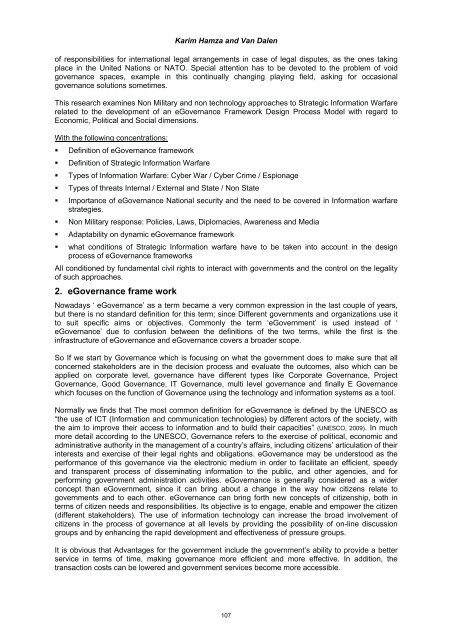6th European Conference - Academic Conferences
6th European Conference - Academic Conferences
6th European Conference - Academic Conferences
You also want an ePaper? Increase the reach of your titles
YUMPU automatically turns print PDFs into web optimized ePapers that Google loves.
Karim Hamza and Van Dalen<br />
of responsibilities for international legal arrangements in case of legal disputes, as the ones taking<br />
place in the United Nations or NATO. Special attention has to be devoted to the problem of void<br />
governance spaces, example in this continually changing playing field, asking for occasional<br />
governance solutions sometimes.<br />
This research examines Non Military and non technology approaches to Strategic Information Warfare<br />
related to the development of an eGovernance Framework Design Process Model with regard to<br />
Economic, Political and Social dimensions.<br />
With the following concentrations:<br />
Definition of eGovernance framework<br />
Definition of Strategic Information Warfare<br />
Types of Information Warfare: Cyber War / Cyber Crime / Espionage<br />
Types of threats Internal / External and State / Non State<br />
Importance of eGovernance National security and the need to be covered in Information warfare<br />
strategies.<br />
Non Military response: Policies, Laws, Diplomacies, Awareness and Media<br />
Adaptability on dynamic eGovernance framework<br />
what conditions of Strategic Information warfare have to be taken into account in the design<br />
process of eGovernance frameworks<br />
All conditioned by fundamental civil rights to interact with governments and the control on the legality<br />
of such approaches.<br />
2. eGovernance frame work<br />
Nowadays ‘ eGovernance’ as a term became a very common expression in the last couple of years,<br />
but there is no standard definition for this term; since Different governments and organizations use it<br />
to suit specific aims or objectives. Commonly the term ‘eGovernment’ is used instead of ‘<br />
eGovernance’ due to confusion between the definitions of the two terms, while the first is the<br />
infrastructure of eGovernance and eGovernance covers a broader scope.<br />
So If we start by Governance which is focusing on what the government does to make sure that all<br />
concerned stakeholders are in the decision process and evaluate the outcomes, also which can be<br />
applied on corporate level, governance have different types like Corporate Governance, Project<br />
Governance, Good Governance, IT Governance, multi level governance and finally E Governance<br />
which focuses on the function of Governance using the technology and information systems as a tool.<br />
Normally we finds that The most common definition for eGovernance is defined by the UNESCO as<br />
“the use of ICT (Information and communication technologies) by different actors of the society, with<br />
the aim to improve their access to information and to build their capacities” (UNESCO, 2009). In much<br />
more detail according to the UNESCO, Governance refers to the exercise of political, economic and<br />
administrative authority in the management of a country’s affairs, including citizens’ articulation of their<br />
interests and exercise of their legal rights and obligations. eGovernance may be understood as the<br />
performance of this governance via the electronic medium in order to facilitate an efficient, speedy<br />
and transparent process of disseminating information to the public, and other agencies, and for<br />
performing government administration activities. eGovernance is generally considered as a wider<br />
concept than eGovernment, since it can bring about a change in the way how citizens relate to<br />
governments and to each other. eGovernance can bring forth new concepts of citizenship, both in<br />
terms of citizen needs and responsibilities. Its objective is to engage, enable and empower the citizen<br />
(different stakeholders). The use of information technology can increase the broad involvement of<br />
citizens in the process of governance at all levels by providing the possibility of on-line discussion<br />
groups and by enhancing the rapid development and effectiveness of pressure groups.<br />
It is obvious that Advantages for the government include the government’s ability to provide a better<br />
service in terms of time, making governance more efficient and more effective. In addition, the<br />
transaction costs can be lowered and government services become more accessible.<br />
107

















